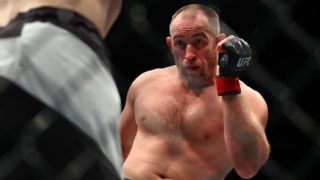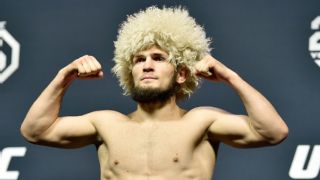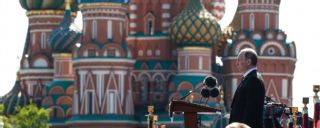|
Editor's note: The UFC provided data on the event's ticket sales after the story was originally published. This has been added below. Part of the story also has been corrected. See below. In December 2016, five months after his Hollywood talent agency had purchased the UFC, Ari Emanuel was on a plane headed to Moscow. The CEO of WME-IMG (now called Endeavor) was with other UFC executives on their way to meet Russia's then-minister of sport, Vitaly Mutko. The team from the UFC was hoping to set the wheels in motion for a UFC event in Russia. For years, the world's leading promotion in MMA had been promising fans it would enter the Russian market, yet nothing had come of those efforts. But now the UFC had been able to secure a meeting with a high-ranking Kremlin official. And, finally, they were successful in getting a stamp of approval. Within the span of two years, the proposed blueprint has become reality. On Saturday, Mark Hunt and Oleksiy Oliynyk will face off in the main event of a UFC Fight Night at Olimpiyskiy Stadium in Moscow. Even with this fight card set to go, however, the UFC still faces obstacles for its long-term business dealings in Russia. There are logistical issues as well as economic concerns due to global sanctions and a financial system in recession. While the fight promotion has taken some interesting steps to mitigate its risks, including an unexpected partnership with a Russian MMA promotion, there still will be bumps in the road. Bringing shows to Russia will be costly. Like any foreign company, the UFC will have to comply with various bureaucratic obstacles that are unavoidable when doing business in Russia. Welcome to Cold War 2.0Several months ago, the United States Treasury Department imposed sanctions on a handful of Russian individuals and companies, claiming they were "malicious actors working at the behest of the Russian Federation and its military and intelligence units" to conduct cyberattacks against the U.S. This marked just the latest round of punishments, the first coming in December 2016 when the Obama administration placed sanctions on Russia's top intelligence services and expelled 35 diplomats as retaliation for alleged interference during the 2016 U.S. election. During the 18 months that followed, diplomatic relations deteriorated as the two governments imposed sanctions and other punishments on each other as a form of political tit for tat. While the U.S. sanctions primarily target individuals and companies affiliated with Russian president Vladimir Putin, the trickle-down effect impacts ordinary citizens, including professional athletes. The closure of key consulates in both countries, for example, has affected immigration papers as well as short-term visitor and immigrant visas. As a result, this past March, wrestlers from Russia were unable to attend the United World Wrestling Senior Men's Freestyle Wrestling World Cup in Iowa City after the U.S. Embassy in Moscow failed to secure travel visas in time. "We simply received too many such requests at a time of very limited appointment availability," the diplomatic staff at the embassy wrote to Sen. Chuck Grassley (R-Iowa). "Wait times have grown significantly longer than they were before the reduction of our staff, and could be many months." Despite the tense political climate, the UFC pushed forward to make its Moscow debut a reality. Much of the event pits Russian fighters popular in their country against an assemblage of competitors from around the world, including four from the United States. None of the Americans appear to have struggled to secure a visa. However, while it appears the diplomatic concerns have had minimal impact on the UFC's inaugural show in Moscow, the lengthier visa process and hostile climate could prove to be a burden on the promotion's ability to host future shows in Russia, especially when coupled with the economic concerns looming over the event. High risk, but a minimal reward?In 2014, the Russian economy plunged into its worst recession in over 20 years. It began with plummeting oil prices, which severely reduced the country's revenue from oil exports. Russia's gross domestic product shrank by 3.7 percent, causing the number of Russians living in poverty to increase by over 3 million to 19.2 million in 2015, according to the World Economic Forum. That and a stunning depreciation in currency have left many Russians with less disposable income. As a result, ticket prices for MMA events in Russia have dropped significantly since in 2015. Tickets for a regional show start at 500 rubles (approximately $8 USD), which is significantly less than the cost of the cheapest seats for shows in North America. This economic reality reportedly prompted the UFC to lower the average price of tickets for this weekend's Fight Night event in Moscow, which will diminish the live gate. According to Russian state media outlet Tass, UFC Moscow tickets range from 1,500 rubles (approx. $22 USD) to 32,000 rubles (approx. $466 USD). By contrast, according to Tass, prices for a UFC Fight Night in Hamburg, Germany, ranged from the equivalent of 3,400 to 90,870 rubles. "We expect our Moscow event to be one of UFC's highest-attended shows in history," said a UFC spokesperson. "We've already sold more than 20,000 tickets, which is a remarkable achievement for a first-time event in a new market. Russia has all the characteristics to be a major market for the UFC, including a pool of talented athletes, a cultural affinity for the sport, and a large economy. We anticipate that Russia will be a top 10 country by revenue for UFC within the next few years." The UFC stated that they are continuing to open up additional seats as demand requires. As of Friday, tickets were available for as little as 1,500 rubles at the ticket agency Kassir and for not much more on StubHub.  With proceeds from ticket sales limited due to their strategic pricing efforts, the UFC will have to rely on other sources of revenue for this show and future ones in Russia, including a television deal, sponsorships and advertising. But the UFC cannot rely on pay-per-view -- one of its major sources of revenue -- for events in Russia. This is largely due to the time difference between Moscow and the eastern United States -- the UFC begins its pay-per-views at 10 p.m. ET, which is 5 a.m. in Moscow. For that reason, UFC lightweight champion Khabib Nurmagomedov, a native of the republic of Dagestan and arguably the most popular fighter in Russia, does not expect to be booked to fight in Russia. "For pay-per-view show, Russia is not very good," Nurmagomedov told reporters last year. "For pay-per-view show, maybe Madison Square Garden or T-Mobile Arena. But Russia? Maybe UFC make Fight Night in Russia, but why I need fight in Fight Nights? I need to fight on pay-per-view." Nurmagomedov's comments confirm the assumption that the UFC is unlikely to host big events in the Russian Federation, despite taking steps to get its foot in the door in one of the world's largest economies. There are simply far too many financial concerns, including a struggling economy and political tension between the United States and Russia. However, despite the obstacles standing in its way, the UFC has partnered with Russia's oldest MMA promotion to improve its odds of success in a new country. Strange bedfellowsOn July 18, M-1 Global announced a partnership under which the longtime Russian MMA promotion will become a farm system for fighters from that country to possibly join the UFC. M-1 Global also has agreed to help promote UFC shows in Russia. The joint venture teams the two promotions with the Mubadala Investment Company and the Russia-China Investment Fund to establish UFC Russia. In effect, this means that the U.S.-based UFC will work with sovereign wealth funds from Russia, China and the United Arab Emirates to strengthen its position in the Russian market. "When the UFC decided to enter the Russian MMA market, they had a few meetings with potential partners," M-1 Global founder Vadim Finkelchtein told ESPN. "Around half a year ago, we met with Ari Emanuel, and he asked us which kind of partnership could be interesting for us. I answered that we would be honored to be partners with the best MMA promotion in the world and we are ready to pass along our top fighters to them, who are already quite famous and well-known for the Russian MMA fans. Emanuel said that he sees no problems with that, and we started negotiating the contract."  This partnership surprised fans and pundits alike, given the longstanding history between the UFC and M-1 Global. Over the past decade, the two MMA organizations maintained a well-documented rivalry. Several years ago, the UFC was trying to secure a deal with heavyweight great Fedor Emelianenko, who happened to be managed by Finkelchtein, and the snag was that Dana White & Co. were reluctant to co-promote with M-1 Global. As a result, there was no deal. White's inability to sign one of MMA's most in-demand fighters soured his already-fraught relationship with the Russian promotion. During interviews, he began referring to Finkelchtein as "Vadummy." Now they're partners. The UFC's decision to partner with foreign investors and M-1 Global could suggest that the promotion is prepared to relinquish complete control over its shows, at least in Russia, and redistribute it among local promoters with more experience dealing with the bureaucracy. It also could simply be just another partnership. While M-1 Global will primarily serve as a farm system, that company's experience hosting events in Russia could be important to the UFC. According to a UFC source, "UFC will retain final decision-making ability over its events in Russia. M-1 will be potential source for talent, nothing more." Finkelchtein, on the other hand, is open for much more. "If UFC has any questions about organizing events in Russia, has issues with local paperwork or getting permits, M-1 Global is always ready to help," said Finkelchtein. It will be interesting to see if the UFC can overcome the obstacles of dealing with a troubled economy, a foreign bureaucracy and various geopolitical concerns. The world's leading MMA promotion also will need to compete for market share against established promotions in the region, such as Absolute Championship Berkut and Fight Nights Global. While it is a formidable task, the UFC's newfound partner believes it is possible. "The Russian MMA market is not the strongest one, at least for now," said Finkelchtein. "But the UFC thinks globally and works towards the future." This story previously reported that UFC president Dana White was on the 2016 trip to Russia. White was not on the trip.
|

